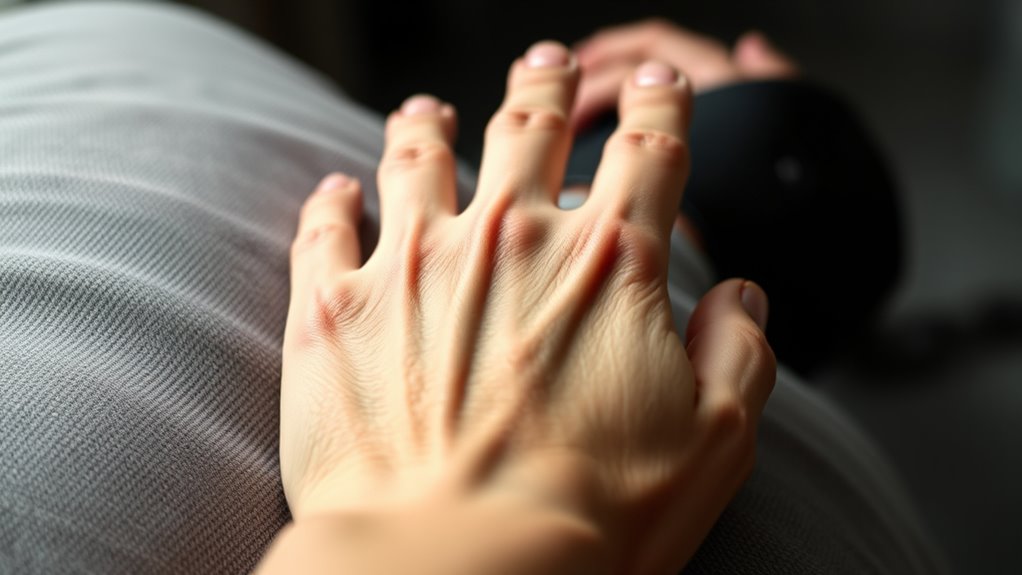If you’re experiencing hand numbness, it’s often caused by nerve compression, repetitive motions, or inflammation that narrow your carpal tunnel. You might notice tingling, weakness, or fingers going numb, especially during activities or at night. To fix this, try wrist splints, take breaks, do stretches, and maintain good ergonomics. Still numb or concerned? There’s more to understand about your symptoms and how to protect your hands long-term.
Key Takeaways
- Nerve compression, such as in carpal tunnel syndrome, is a common cause of hand numbness.
- Repetitive motions and poor ergonomics can lead to nerve irritation and numbness.
- Early symptoms include tingling, burning, and decreased grip strength, which can worsen without treatment.
- Preventive measures include wrist splints, regular breaks, stretching, and proper workstation ergonomics.
- Medical options like anti-inflammatory medications, corticosteroid injections, or surgery can relieve nerve compression.

Hand numbness can be a temporary nuisance or a sign of a more serious condition. When your hand goes numb unexpectedly, it’s often due to nerve compression, with one common culprit being carpal tunnel syndrome. The carpal tunnel is a narrow passageway in your wrist that houses the median nerve, which supplies sensation to your thumb, index, middle, and part of your ring finger. When this nerve gets compressed, it results in numbness, tingling, or weakness in those fingers and sometimes the palm. This nerve compression can happen for various reasons, including repetitive motions, inflammation, or swelling that narrows the tunnel and puts pressure on the nerve. If you spend long hours typing, using a mouse, or performing repetitive hand tasks without proper ergonomics, you’re at greater risk of developing carpal tunnel syndrome.
Nerve compression from repetitive motions can cause hand numbness and tingling, especially in carpal tunnel syndrome.
You might notice numbness during specific activities or at night when your wrist is bent or compressed. This discomfort often starts gradually and may be accompanied by a tingling sensation or a burning feeling. If ignored, the symptoms can worsen, leading to decreased grip strength and difficulty performing daily tasks. To address this, you can start with simple measures like wrist splints, especially worn at night, to keep your wrist in a neutral position and reduce nerve compression. Taking regular breaks from repetitive tasks, stretching your hands and wrists, and maintaining proper ergonomics at your workstation can also help alleviate symptoms.
In more persistent cases, medical interventions might be necessary. A healthcare professional could recommend anti-inflammatory medications to reduce swelling or, in severe situations, corticosteroid injections for immediate relief. If nerve compression persists and causes significant nerve damage, surgery may be considered. Carpal tunnel release surgery involves cutting the ligament that forms the roof of the tunnel, relieving pressure on the median nerve. This procedure often results in a significant reduction of numbness and tingling and restores hand function.
Preventing hand numbness related to nerve compression hinges on understanding your body’s signals and making ergonomic adjustments. Keep your wrists in a neutral position during activities, avoid excessive force or prolonged pressure on your hands, and incorporate regular stretches. If numbness persists despite these measures, don’t ignore it; consulting a healthcare professional ensures you get a proper diagnosis and appropriate treatment. Recognizing early signs of nerve compression and taking action can prevent long-term nerve damage and help you regain full hand function faster.
Frequently Asked Questions
Can Hand Numbness Indicate a Heart Problem?
Hand numbness can sometimes signal heart symptoms, especially if accompanied by chest pain or dizziness, but it’s more often linked to nerve issues or circulation problems. If you experience numbness alongside shortness of breath or pain radiating to your arm, seek medical attention promptly. While nerve issues are common causes, never ignore signs that could indicate a heart problem. Always consult a healthcare professional to determine the cause and receive proper care.
How Long Is Too Long to Experience Hand Numbness?
If you experience hand numbness lasting more than a few minutes, it’s a concern, especially if it’s persistent or worsening. Duration concerns often point to nerve compression or other underlying issues that need medical attention. Don’t ignore numbness that lasts longer than 15-20 minutes or comes with additional symptoms like weakness or chest pain. Seek prompt medical evaluation to determine the cause and prevent potential complications.
Are There Specific Exercises to Prevent Hand Numbness?
Your hands are more resilient than a superhero’s shield, so regular exercises help prevent numbness. Try simple hand stretches like finger spreads or wrist circles daily. Nerve exercises, such as gentle nerve glides, can also keep your nerves healthy. Incorporate these activities into your routine to promote circulation and flexibility. Consistency is key—don’t wait until numbness strikes; proactive moves keep your hands functioning at their best!
Does Hand Numbness Always Require Medical Treatment?
Hand numbness doesn’t always require medical treatment. You can try home remedies and lifestyle modifications first, like stretching, improving your posture, and taking regular breaks from repetitive activities. If numbness persists or worsens, see a healthcare professional to rule out underlying issues. Addressing habits early can often reduce symptoms, but don’t ignore persistent numbness, as it may signal a serious condition needing medical attention.
Can Dietary Changes Help Reduce Hand Numbness?
Yes, dietary adjustments can help reduce hand numbness, especially if nutritional deficiencies are involved. You should focus on eating foods rich in B vitamins, magnesium, and omega-3 fatty acids, which support nerve health. Incorporate more whole grains, leafy greens, nuts, and fish into your diet. These nutritional improvements can alleviate symptoms by addressing underlying deficiencies, but if numbness persists, consult a healthcare professional for proper diagnosis and treatment.
Conclusion
So, next time your hand falls asleep, don’t panic—it’s probably just your body’s way of saying it’s bored or overstretched. Ironically, the very things you do to stay active might be causing the numbness. Instead of ignoring it, take a break, stretch, or adjust your posture. After all, a little awareness now can save you from a frustrating, tingling mystery later. Who knew that simple fixes could keep your hands happy and numbness at bay?









